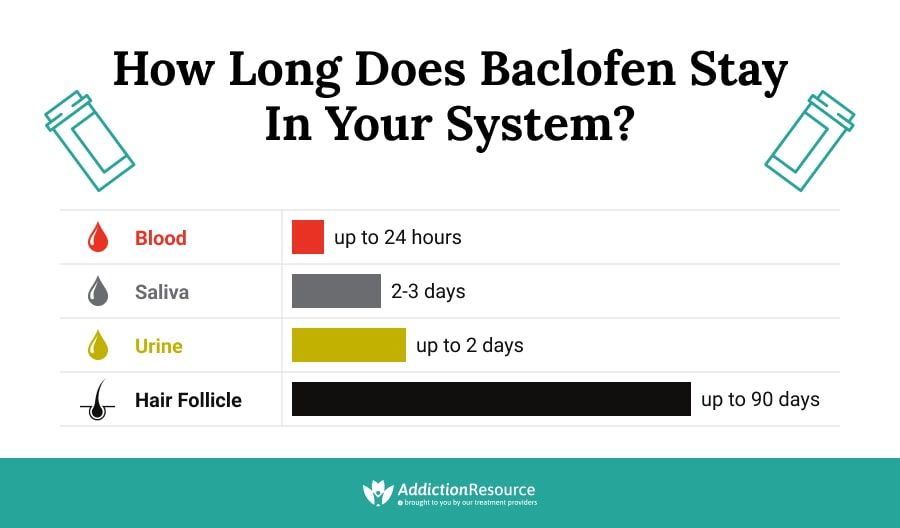Muscle relaxants such as Baclofen (Lioresal) have been widely used over the years. Patients use this medication for treating spasticity caused by spinal cord injuries, muscle spasms, and multiple sclerosis. The drug is also helpful in treating alcohol use disorder. Most patients who are planning to undergo Lioresal treatment or even have already been prescribed it do not know the Baclofen mechanism of action. Learning how it works is helpful to make the treatment process more effective and can even help prevent an overdose.
Table Of Contents:
Since it is used for the long term, the presence of Lioresal in the body and its possibility to fail a drug test is also a crucial piece of information to know.
How long does Baclofen stay in your system? How does it work, and what is its half-life? And finally, does Baclofen show up on a drug test? Read further to find answers.
Baclofen Mechanism of Action
Currently, the precise Baclofen mechanism of action is not fully known. According to the study, it is indicated that it is a GABA-B receptor agonist. Although this is somewhat true, there is no evidence that Lioresal’s effects on GABA systems are involved in its clinical effects.
Gablofen is proven helpful on the spinal site of action and is widely used as an antispastic agent. This is one of the points where Baclofen is similar to Flexeril. Compared to other antispastic agents, its pharmacological properties and mechanism of action differ.
GABA-B receptors affect and interact with neurotransmitter systems and signal transduction pathways. Baclofen MOA also employs an antinociceptive effect. This clinical significance deserves further study and research to clarify its result.

According to the Baclofen MOA, it reduces the level of activity of the monosynaptic and polysynaptic reflex transmission by various actions, similar to some alternatives, and by the simulation of GABA-B receptors. It results in the inhibition of aspartate and glutamate release, contributing to or triggering spasticity and pain.
How Long Does Baclofen Take to Work?
Noticing the effects of this drug varies among individuals. For example, one can be prescribed Baclofen 10 mg three times a day but won’t feel the effects for days. Others can be prescribed that same dose but will feel the effects of the drugs immediately. According to Baclofen MOA studies, and reviews from users, improvement starts to show from two days to two weeks of the initial prescription time as long as the patient continuously follows the treatment plan.
How Long Does Baclofen Stay In Your System?
Baclofen half-life is the term used to denote the time taken for half the amount of a specific medication to be removed from the body. The half-life of Baclofen is estimated to range from 4 hours to 6.8 hours. The short half-life makes it necessary for frequent Lioresal doses to consistently ensure the medication controls spasticity and muscle spasms.

The medication’s route of elimination from the body is extensive and very rapid. The drug is excreted primarily by the kidney as an unchanged substance. About 70-80% of a single dose is estimated in urine as an unchanged substance. The rest is excreted unchanged as feces or as metabolites.
From Baclofen half-life, it’s clear that the period the substance requires to exit from the body entirely is from 10 to 20 hours. It may stay in the system for up to 72 hours if taken in large amounts. Knowing this time span will help to anticipate the onset of withdrawal symptoms and circumvent them adequately. The withdrawal treatment generally involves restarting the dose. This process should be followed with gradual tapering of the drug instead of abruptly stopping the drug intake.
Does Baclofen Show Up on a Drug Test?
Gablofen is not part of the standard list of drugs featured in a drug screening list. Muscle relaxants aren’t commonly tested. But if testing is done, specifically in case of Lioresal and alcohol intake, it is necessary to know the duration of the drug’s presence in the body. This knowledge is also essential when it is used along with other central nervous suppressants.
Urine
Gablofen is primarily eliminated from the body via urine. Hence it can be easily identified in a urine sample taken for nearly two days after the drug intake. The drug stays for a longer time if a high dose intake or Lioresal overdose occurs. In such cases, urine drug tests will turn positive for up to 10 days.
Blood
According to the half-life of Baclofen, it can be detected in the blood for a minimum of 24 hours or less in a majority of cases. Like in the case of urine, the duration will be longer if there is an overdose or large intake. The presence of the medicine will extend to around 10 days as a result.
Saliva
Lioresal stays in saliva for the same duration as in blood. It will not be detected after 2-3 days of intake.

Factors That Influence How Long Lioresal Stays in One’s System
Several factors influence the presence of Gablofen in the system.
How Long Baclofen Lasts in the Body Depends on Such Factors As:
- Age: This is a significant factor of Gablofen staying in the system. For seniors, the time taken is much longer when compared to a younger age group.
- Body mass: The higher the body mass is, the more time the substance remains in the system.
- Dose: Lioresal dose and form of taking also exert a strong influence — higher dose results in longer elimination time.
- Duration of treatment: For patients who have been using this drug for an extended period, the time taken to eliminate it from the system is longer. It happens because of the accumulation of the drug in the body over the long term.
- A rate of metabolism: A higher metabolic rate helps remove the drug faster from the body.
When used appropriately, Lioresal is the best medication for treating muscle spasticity in young and older people. It is also helpful in alcohol addiction. Overdose or abrupt withdrawal should be avoided.
How Lioresal Produces Its Effects
When a patient is diagnosed with neurological diseases closely related to the spasm of skeletal muscles, they are administered Lioresal pills or intrathecal pumps. Due to Baclofen MOA, the clinical effects occur. This can affect muscle contractions, providing significant relief from automatism, clonus, and painful spasms. Lioresal provides its users with improved mobility and an increased level of independence while facilitating both active and passive physiotherapy. The medication increases the secretion of gastric acid as well.
The drug also has anti-inflammatory properties, which can be helpful in the study of addiction treatment. The study conducted by The Acute Care Nurse Practitioners shows that GABA-B receptors have roles in-memory storage and retrieval, anxiety, motivation, reward, and even mood as well.
Neuroimaging studies conducted by the National Center for Biotechnology Information also indicate that drugs like Lioresal cause region-specific alterations in brain activity. Due to these reasons, patients who use the medication for a long time should not stop immediately to avoid having Baclofen withdrawal syndrome.
Clearing Lioresal From The System
Baclofen is a muscle relaxant effective in treating multiple sclerosis, cerebral palsy, and injuries of the spinal cord. For individuals taking it for the treatment of muscular spasticity, there are concerns regarding the use of the drug over a long period. It can cause drowsiness, CNS depressant symptoms, and other side effects of Baclofen. For this reason, a drug test for Lioresal may be taken.
Users should keep in mind that despite Baclofen half-life information, drugs can be eliminated differently in each unique body, and multiple factors can affect it.
Lioresal is not featured in a standard drug screening list, but sometimes special tests can be done.
The most effective way to get drugs out of one’s system is to stop taking them. However, patients shouldn’t do it on their own. Lioresal needs to be tapered off under medical supervision. Contact a doctor who will ensure safety and probably prescribe some alternative drugs.
Hope Without Commitment
Find the best treatment options. Call our free and confidential helpline
Most private insurances accepted
Page Sources
- DENNIS S. CHARNEY, WAYNE C. DREVETS, NEUROBIOLOGICAL BASIS OF ANXIETY DISORDERS, Neuropsychopharmacology: The Fifth Generation of Progress. Edited by Kenneth L. Davis, Dennis Charney, Joseph T. Coyle, and Charles Nemeroff. American College of Neuropsychopharmacology 2002. https://acnp.org/wp-content/uploads/2017/11/CH63_901-930.pdf
- De Beaurepaire, R. (2018). A review of the potential mechanisms of action of baclofen in alcohol use disorder. Frontiers in psychiatry, 9, 506. https://www.ncbi.nlm.nih.gov/pmc/articles/PMC6232933/
- Ghanavatian S, Derian A. Baclofen. [Updated 2021 May 15]. In: StatPearls [Internet]. Treasure Island (FL): StatPearls Publishing; 2021 Jan-. Available from: https://www.ncbi.nlm.nih.gov/books/NBK526037/
- Terunuma, M. (2018). Diversity of structure and function of GABAB receptors: a complexity of GABAB-mediated signaling. Proceedings of the Japan Academy, Series B, 94(10), 390-411. https://www.ncbi.nlm.nih.gov/pmc/articles/PMC6374141/
- Ghose, K., Holmes, K. M., & Matthewson, K. (1980). Complications of baclofen overdosage. Postgraduate medical journal, 56(662), 865-867. https://pubmed.ncbi.nlm.nih.gov/7267501/
- Wuis, E. W., Dirks, M. J. M., Termond, E. F. S., Vree, T. B., & Van der Kleijn, E. (1989). Plasma and urinary excretion kinetics of oral baclofen in healthy subjects. European journal of clinical pharmacology, 37(2), 181-184. https://pubmed.ncbi.nlm.nih.gov/2792173/




